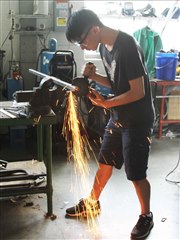“Two years ago, around 1,000 people would go to the Rivanna Recycling Center per week, and now more than 1,000 people visit per day. So, the trend is growing, but they don’t have enough resources to process all the plastic,” Misha Espinoza, founder of Tunari, explains. As the popularity of recycling increases, there is a need for more efficient ways to handle all of the plastic.
Tunari is a company that shreds, melts, and processes recycled plastics with their unique machines that are designed to treat the plastics locally. Some plastics are not recyclable, and most of it goes to different dumpsters and landfills. Tunari is finding a way to reuse plastic more efficiently by doing it locally. The current procedure that recycling centers use often involves shipping the plastic off to a different location for processing. “This requires a lot of time and effort to hire people and pay for trucks to deliver it and sometimes there isn’t even space for it,” Misha explains. “We thought, what if we process plastic locally and then we don’t have to do all of that.”
There hasn’t been innovation in the plastics processing industry in the past few decades, which means there’s a lot of room for improvement. Misha and his co-founder, John Kim, both have backgrounds in computer science and are excited about bringing their tech background to the recycling industry.
This summer, Misha and John have built prototypes of their machines that will process their plastic. There are three machines needed for their procedure. The first machine shreds the plastic into tiny dust, the second machine melts the plastic, and the third machine molds it into objects.
“Our business functions through a 3 step process. First, we have to collect plastics from different companies. Mainly we collect from the Rivanna Recycling Center so they don’t have to use all of those resources to send it to Fisherville,” John explains. “The next is actually reforming and processing the plastics it into something much more manageable in terms of both space and usability, and then lastly manufacturing it into a final product which we could sell.”
Currently, Misha and John are building a larger prototype than their current smaller versions. Eventually, they want to open up their own recycling center so that they can collect and treat the plastics themselves, which would help speed up the process.


John Kim and Misha Espinoza, co-founders of Tunari. John working on building the hardware for Tunari.
